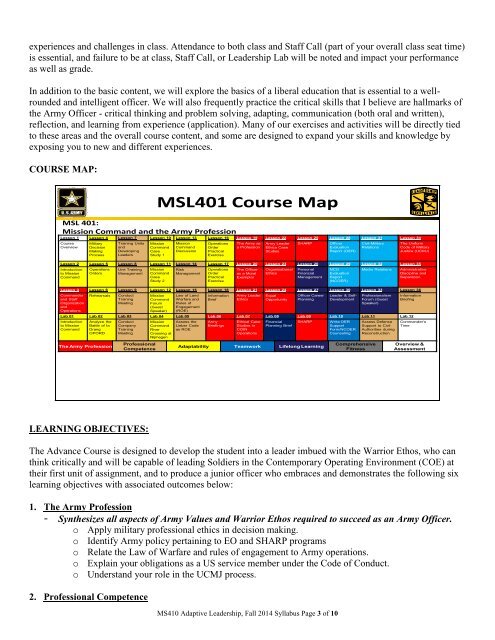appendix_finalized
Create successful ePaper yourself
Turn your PDF publications into a flip-book with our unique Google optimized e-Paper software.
experiences and challenges in class. Attendance to both class and Staff Call (part of your overall class seat time)<br />
is essential, and failure to be at class, Staff Call, or Leadership Lab will be noted and impact your performance<br />
as well as grade.<br />
In addition to the basic content, we will explore the basics of a liberal education that is essential to a wellrounded<br />
and intelligent officer. We will also frequently practice the critical skills that I believe are hallmarks of<br />
the Army Officer - critical thinking and problem solving, adapting, communication (both oral and written),<br />
reflection, and learning from experience (application). Many of our exercises and activities will be directly tied<br />
to these areas and the overall course content, and some are designed to expand your skills and knowledge by<br />
exposing you to new and different experiences.<br />
COURSE MAP:<br />
MSL 401:<br />
Mission Command and the Army Profession<br />
MSL401 Course Map<br />
Lesson 1 Lesson 4 Lesson 7 Lesson 10 Lesson 13 Lesson 16 Lesson 19 Lesson 22 Lesson 25 Lesson 28 Lesson 31 Lesson 34<br />
Course<br />
Military<br />
Training Units<br />
Mission<br />
Mission<br />
Operations<br />
The Army as<br />
Army Leader<br />
SHARP<br />
Officer<br />
Civil-Military<br />
The Uniform<br />
Overview<br />
Decision<br />
and<br />
Command<br />
Command<br />
Order<br />
a Profession<br />
Ethics Case<br />
Evaluation<br />
Relations<br />
Code of Military<br />
Making<br />
Developing<br />
Case<br />
Discussion<br />
Practical<br />
Studies<br />
Report (OER)<br />
Justice (UCMJ)<br />
Process<br />
Leaders<br />
Study 1<br />
Exercise<br />
Lesson 2 Lesson 5 Lesson 8 Lesson 11 Lesson 14 Lesson 17 Lesson 20 Lesson 23 Lesson 26 Lesson 29 Lesson 32 Lesson 35<br />
Introduction<br />
Operations<br />
Unit Training<br />
Mission<br />
Risk<br />
Operations<br />
The Officer<br />
Organizational<br />
Personal<br />
NCO<br />
Media Relations<br />
Administrative<br />
to Mission<br />
Orders<br />
Management<br />
Command<br />
Management<br />
Order<br />
as a Moral<br />
Ethics<br />
Financial<br />
Evaluation<br />
Discipline and<br />
Command<br />
Case<br />
Practical<br />
Exemplar<br />
Management<br />
Report<br />
Separation<br />
Study 2<br />
Exercise<br />
(NCOER)<br />
Lesson 3 Lesson 6 Lesson 9 Lesson 12 Lesson 15 Lesson 18 Lesson 21 Lesson 24 Lesson 27 Lesson 30 Lesson 33 Lesson 36<br />
Commander<br />
Rehearsals<br />
Conduct<br />
Mission<br />
Law of Land<br />
Information<br />
Army Leader<br />
Equal<br />
Officer Career<br />
Leader & Self-<br />
Professionalism<br />
Information<br />
and Staff<br />
Training<br />
Command<br />
Warfare and<br />
Brief<br />
Ethics<br />
Opportunity<br />
Planning<br />
Development<br />
Forum (Guest<br />
Briefing<br />
Organization<br />
Meeting<br />
Forum<br />
Rules of<br />
Speaker)<br />
and<br />
(Guest<br />
Engagement<br />
Operations<br />
Speaker)<br />
(ROE)<br />
Lab 01 Lab 02 Lab 03 Lab 04 Lab 05 Lab 06 Lab 07 Lab 08 Lab 09 Lab 10 Lab 11 Lab 12<br />
Introduction<br />
Analyze the<br />
Conduct<br />
Mission<br />
Assess the<br />
Army<br />
Ethical Case<br />
Financial<br />
SHARP<br />
Write OER<br />
Assess Defense<br />
Commander’s<br />
to Mission<br />
Battle of Ia<br />
Company<br />
Command<br />
Lieber Code<br />
Briefings<br />
Studies in<br />
Planning Brief<br />
Support<br />
Support to Civil<br />
Time<br />
Command<br />
Drang<br />
Training<br />
River<br />
as ROE<br />
COIN<br />
Form/NCOER<br />
Authorities during<br />
OPORD<br />
Meeting<br />
Crossing at<br />
Operations<br />
Counseling<br />
Reconstruction<br />
Nijmegen<br />
The Army Profession<br />
Professional<br />
Competence<br />
Adaptability Teamwork Lifelong Learning<br />
Comprehensive<br />
Fitness<br />
Overview &<br />
Assessment<br />
LEARNING OBJECTIVES:<br />
The Advance Course is designed to develop the student into a leader imbued with the Warrior Ethos, who can<br />
think critically and will be capable of leading Soldiers in the Contemporary Operating Environment (COE) at<br />
their first unit of assignment, and to produce a junior officer who embraces and demonstrates the following six<br />
learning objectives with associated outcomes below:<br />
1. The Army Profession<br />
- Synthesizes all aspects of Army Values and Warrior Ethos required to succeed as an Army Officer.<br />
o Apply military professional ethics in decision making.<br />
o Identify Army policy pertaining to EO and SHARP programs<br />
o Relate the Law of Warfare and rules of engagement to Army operations.<br />
o Explain your obligations as a US service member under the Code of Conduct.<br />
o Understand your role in the UCMJ process.<br />
2. Professional Competence<br />
MS410 Adaptive Leadership, Fall 2014 Syllabus Page 3 of 10


